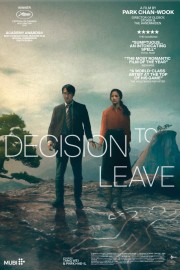Decision to Leave
Park Chan-Wook is a filmmaker not to be explored lightly. His worlds are often dark and unsettling, and his stories always look at stories that challenge their characters. It’s been a few movies since I’ve entered one of his worlds- 2013’s “Stoker”- and “Decision to Leave” made for an intriguing re-entry. The film looks at what happens when a police detective gets enamored with a suspect. Done one way, this film could have become “Basic Instinct.” Done as Park does it here, it’s haunting, uncertain and compelling.
Detective Hae-jun (Park Hae-il) is investigating the death of a man who fell climbing on a steep climb. Things seem pretty open and shut about the case- it was an accident, right? That being said, an investigation is necessary. The man’s wife, Seo-rae (Tang Wei), comes in to see the body, and right away, there’s a connection he makes with her; even though he’s married, he just can’t stop thinking about her. Soon, however, more evidence builds to imply it was murder. And her mother was killed back in China. Seems suspicious. Hae-jun can’t keep away, though.
The screenplay by Park Chan-wook and Seo-kyeong Jeong certainly has shades of Hitchcock, with a third act that feels right out of “Vertigo,” but Hae-jun understands there are some lines he cannot cross, not just as a detective, but as a husband. His marriage feels strong, it seems, and he even gets a transfer to be with her more. There’s always something about the forbidden, however, that exerts a hold, and Seo-rae seems unafraid to push him into situations to have them together, even when she is with someone new. Wei is terrific at projecting a sense of mystery around her that makes it understandable why Hae-jun would be so fascinated. And Park Hae-il is excellent as a good detective who is going about his routine as a cop, even when it’s out of the ordinary how he goes about it. There’s a fascinating tone to the film in the way it builds the connection between the characters quietly, and concurrently to his going about his business when it comes to other cases, after hers is seemingly closed. The film feels very comedic, at times, while also capturing a feeling between these characters that brings to mind “In the Mood for Love.” Admittedly, there are times when the film loses the story, in my opinion, but you cannot help but continue to follow these characters all the same.
This is a beautifully shot and scored film. There are moments when the cinematography by Ji-yong Kim communicates so much more about the story and world of the film than what is happening, and the music by Yeong-wook Jo has moments of lovely romance, dark suspense and tragedy. That last part comes most into play in the film’s third act, with an ending that is bleak, but also feels like the only way this film could end. It puts the film in focus, that sometimes, decision to leave is a difficult one, but it’s also the only one we could make.










